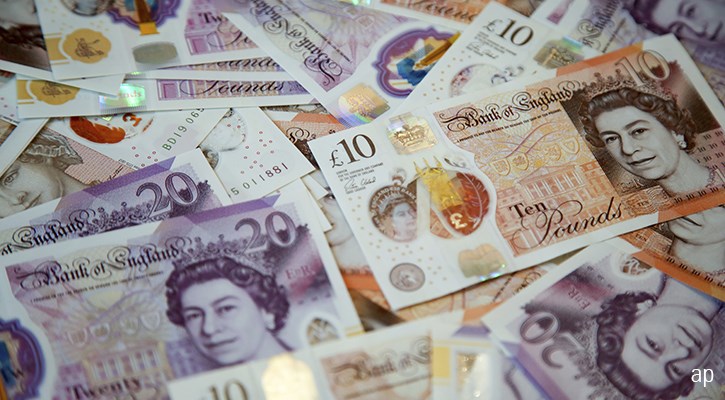
Job uncertainty, no holidays, minimal commuting costs and closed shops are just some of the reasons why some British savers built up big stockpiles of cash in 2020.
The Bank of England estimates that this stockpile could have grown to a staggering £100 billion and while some of this may have been put into pensions, much is languishing in cash savings accounts and looking for a home.
Chancellor Rishi Sunak hopes people will spend this money to help with the recovery, and fund managers owning cyclical stocks like travel and leisure expect “revenge spending” in 2021 on holidays and cars to make up for lost consumption in 2020.
But while cash is comforting in a crisis and can be a useful gift to children/grandchildren who may need the liquid assets to get on the property ladder or buy a car, if you’re fortunate enough to have saved money, here are five reasons not to leave this lingering in cash.
1. Savings Rates Rarely Beat Inflation
The Bank of England cut interest rates to a record low of 0.1% in March 2020 and savings providers having been slashing rates across the board all year. Many accounts pay just 0.01% in interest - nine basis points below the base rate. That means that even with inflation at a very low 0.3% in November, you are still losing money in real terms.
According to Money Saving Expert’s list of top savings rates, the best easy access account pays 0.6% and the best notice account has a rate of 0.7%. Higher rates may be available if you go for a fixed-rate account and put your money away for up to five years, and Isa rates are generally higher, but not by much – many, such as NS&I, just match the Bank of England rate of 0.1%.
2. Rainy Day Funds Can Get Too Big
Locking your money away for more than a year may not make sense if this pot of money is an “emergency fund”. With people losing their jobs or being furloughed this year, a stockpile of cash will have come in very handy. That would have provided a useful buffer for those over 55 who were temped to dip into pension savings (we looked at how Covid-19 has affected retirement here).
Financial advisers usually recommend people holding three to six months' savings in cash and with the economy struggling, some have suggested doubling that. With an average UK net salary of £2,000 a month, that provides a decent buffer of around £12,000 to keep up with mortgage payments and household bills. After £16,000 of savings, you won’t be able to claim Universal Credit anyway, a monthly payment to help the jobless with living costs. (Anything savings below £6,000 don’t affect entitlement to Universal Credit).
3. Long-Term Performance
Many would-be investors feel more comfortable holding cash because they don’t understand the stock market, or are reluctant to seek out financial advice. Countless studies show that equity (and bond) markets outperform cash over the long term – according to wealth manager and broker Charles Stanley, £10,000 invested in global markets in 2010 would now be worth approximately £30,742. The same amount held in a cash savings account would have grown to just £11,230.
“Many consumers are missing out on the opportunity to invest their money and make it work better for them in the longer term,” the Financial Conduct Authority’s latest report on the UK financial advice market. The FCA’s latest research reveals that 37% people with £10,000 of investable money have all of it cash, and 18% have more than three-quarters of their wealth in cash.
Even with last year’s economic and health crisis, many global stock markets finished the year higher than they started. The Morningstar Global Markets index, for example, was up nearly 15% by mid-December. Excluding platform fees, that would have turned £10,000 into £11,150 in less than a year. By comparison, that £10,000 in a 0.6% savings account would have turned into £10,060 - a difference of £1,090. Of course, your attitude to that capital would have been very different in March 2020 when markets crashed.
4. The Old Rules Are Being Ripped Up
The Charles Stanley research is also revealing in that it shows how attitudes to cash and shares among the different generations. Asked why they had invested in the stock market, 42% of 54-74 year olds replied that “returns on cash savings are poor”, but only 12% of 18-23 year olds gave that answer (28% of millennials and 38% of 39-53 year olds gave that as the reason).
People generally become more risk-averse the closer they get to retirement, needing less volatile (and more income-producing assets) as well as liquidity. But of the Baby Boomer age group, some 43% said the main reason for investing was to save for retirement (compared with 11% for the youngest age group).
Some 30% of the 18-23 year olds said their equity investments were to buy a house; suggesting that younger people are prepared to take greater risks with their money to get on to the property ladder. (Our Investor Views column often features young people using investing for this reason). You need cash for a house deposit, of course, but that money held in savings accounts will not grow very much even with compound interest.
5. Cash Doesn't Pay Dividends
2020 was an annus horribilis for UK income investors – dividends in the third quarter were half that of the previous year and the lowest for 10 years. According to Link, dividends totalled around £60 billion in 2020, against a figure of more than £100 billion in 2019. Covid-19 has reset the expectations of many companies, such as the oil giants, which were some of the biggest payers of the FTSE 100. Some companies, such as housebuilders, froze dividends during the market panic in March but have since resumed them.
UK banks were forced by regulators to stop dividend payments but have just been given the green light to resume them (in more limited form) this year. Some of the UK’s biggest companies such as Tesco actually increased their payouts, however. So the outlook for 2021 income investors is likely to be brighter than in 2020 – AJ Bell predicts an 18% increase in FTSE 100 dividends this year as more payments are restored. According to the LSE, the FTSE 100 yields 4.7% - with the “risk-free” UK government bond offering 0.23% and cash rates around 0.1%, investors are being handsomely rewarded for taking on equity risk.




























